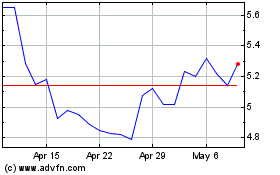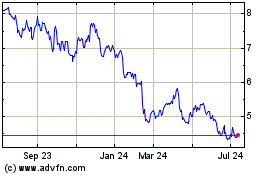By Ruth Bender
This article is being republished as part of our daily
reproduction of WSJ.com articles that also appeared in the U.S.
print edition of The Wall Street Journal (May 11, 2019).
BERLIN -- Shares of Germany's Thyssenkrupp AG surged 28% Friday
after the group said it was dropping a plan to split into two
companies and would instead pursue an initial public offering of
its elevator unit.
The company, which makes steel, elevators and auto components,
also said it would restructure the remaining businesses in a bid to
improve profits.
The surprise U-turn is the latest example of a large, aging
conglomerate being forced to reinvent itself. The company, with
roots in industrial-revolution Germany, has been under pressure
from shareholders to simplify and reorganize its businesses many
regard as inefficient, unfocused, and costly.
Siemens AG, another storied German industrial giant, earlier
this week said it would spin off its troubled gas and power
division, the latest step in Chief Executive Joe Kaeser's efforts
to squeeze more value out of the company's individual businesses
and improve profitability.
While Siemens has gained praise from shareholders for its
pro-active approach to change, Thyssenkrupp has stumbled in its
efforts. An initial plan to form a European steel joint venture has
fallen foul of European antitrust authorities and repeated profit
warnings last year have weighed on its stock.
CEO Guido Kerkhoff said Friday that Thyssenkrupp would now "hit
reset" to build a new company, with the main goal being to improve
performance across divisions. "Sometimes, when a chosen path is no
longer right, one has to turn around in good time," he said of the
decision to abandon the split plans.
The company's shares closed up 28% on the news, after hitting a
nearly 15 year-low earlier this week. Thyssenkrupp shares have lost
roughly 40% since the plans were first announced last year, as
investors grew skeptical of the split.
Thyssenkrupp's overhaul would include the IPO of its most
profitable business -- elevators -- and drastic cost cuts, it
said.
Under the new plan, it will shed more than 6,000 jobs, or nearly
4% of its global workforce, and nearly halve administrative costs
to under EUR200 million ($224 million), Mr. Kerkhoff said.
Bending to pressure from activists, the conglomerate last
September said it would split itself into two independently traded
companies -- one encompassing the capital goods businesses and the
other the group's materials operations, where its traditional steel
business would have resided.
Thyssenkrupp has also been planning a European joint-venture
with India's Tata Steel Ltd. to form Europe's second-largest
steelmaker behind ArcelorMittal SA. Mr. Kerkhoff said Friday that
Margrethe Vestager, the European competition commissioner, told him
that the merger couldn't be approved without further concessions,
which Mr. Kerkhoff said would undermine the economic logic of the
deal.
A person familiar with the matter said the European Commission,
the EU's antitrust enforcer, is expected to block the
ThyssenKrupp-Tata merger in coming weeks, adding that the
concessions put forward by the companies earlier this spring fell
short of what the commission had demanded.
The commission's review of the planned merger is continuing,
with a decision due by June 17, said Commission spokesman Ricardo
Cardoso.
The company lost both its CEO and chairman in less than a month
last summer amid an internal fight over the company's future
direction.
Some key shareholders, including U.S. hedge fund Elliott
Management Corp., feared the now abandoned split plan would create
two mini conglomerates, each holding a mixed bag of assets and both
lacking cost-cutting potential, according to people familiar with
the matter.
While shareholders welcomed Friday's reversal as a sign
management was ready to consider drastic steps, some also warned of
the delicate task ahead. Cevian Capital, Thyssenkrupp's
second-largest investor with a stake of about 18%, said a
"fundamentally new direction was urgently needed."
"There can be no historical or political taboos any longer if
Thyssenkrupp wants to sincerely tackle underperformance and get the
businesses back to growth," said Lars Förberg, founding partner of
Cevian.
The Krupp foundation, which for decades was the steering force
behind Thyssenkrupp as its top shareholder with a roughly 21%
stake, said it would evaluate the new plan based on its capacity to
make all units competitive, guarantee future jobs, and ensure a
sustainable dividend. It had supported both the joint venture and
the split, it said.
Ingo Speich, head of corporate governance at Deka Investment, a
longtime Thyssenkrupp shareholder with a roughly 0.7% holding, said
scrapping the split was the right move but that implementing a
completely new strategy wouldn't be easy.
Mr. Kerkhoff said the IPO of the elevator business would free up
capital to support other businesses. Materials and steel businesses
would be at the heart of Thyssenkrupp after the IPO but the company
is open to entering partnerships for some of its industrial
operations and would consider giving up majority ownership, he
said.
He said there was still a need for consolidation in the European
steel sector, which has struggled for decades with high costs and
global overproduction. With the European Commission having said it
could block the Tata joint venture without further concessions,
however, he said only "small" steps might now be possible.
Ben Dummett and Valentina Pop contributed to this article.
Write to Ruth Bender at Ruth.Bender@wsj.com
(END) Dow Jones Newswires
May 11, 2019 02:47 ET (06:47 GMT)
Copyright (c) 2019 Dow Jones & Company, Inc.
Thyssenkrupp (PK) (USOTC:TKAMY)
Historical Stock Chart
From May 2024 to Jun 2024

Thyssenkrupp (PK) (USOTC:TKAMY)
Historical Stock Chart
From Jun 2023 to Jun 2024
